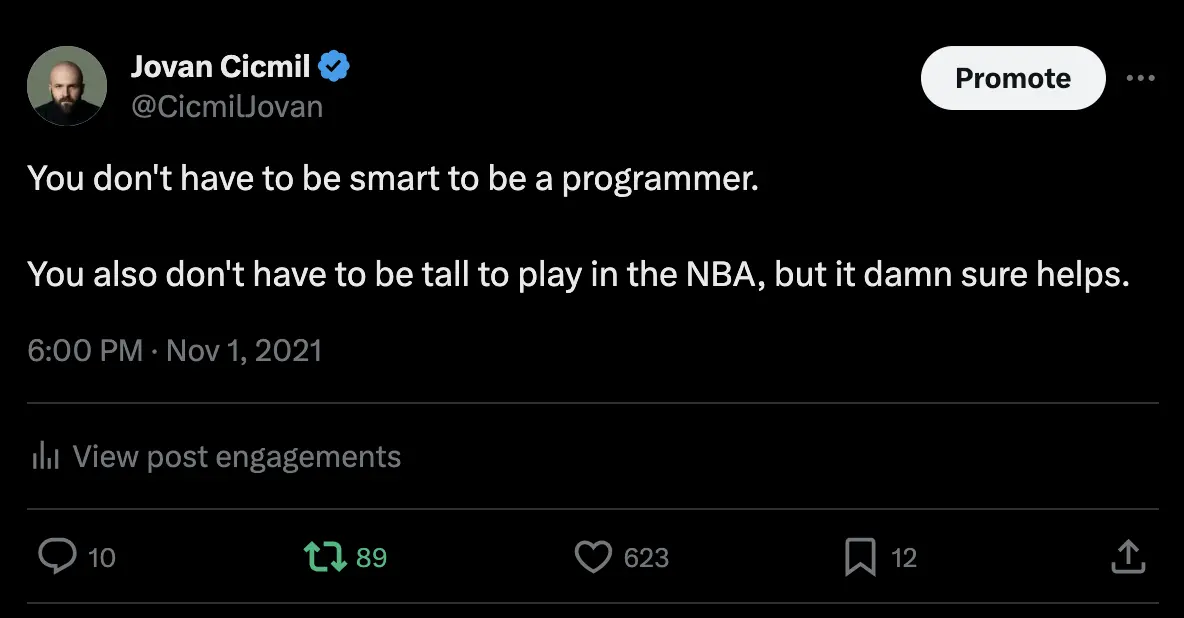
I write equally for beginners and for experienced freelancers who want to earn more or scale their business. But, often, I get questions from those who are only starting to consider freelancing as an option. Here are some of the most common questions I get asked by such readers:
Could I become a freelancer?
What does it take to become a freelancer?
Can anyone become a freelancer?
These boil down to a fundamental question of nature versus nurture: can anyone succeed with enough hard work and focus, or are certain innate abilities required?
I’m a strong believer that talent is no more than 10% of any success story. However, having a certain background or certain personal characteristics helps.
I once made this joke on Twitter:

The same applies to freelancing: anyone can climb that hill, but for some the hill is steeper. For others, you have to tread a gator-infested swamp just to find the hill.
The traits of a great freelancer
First, let’s discuss the traits that can either help your freelance career or hold you back. Some of these are beyond your control, at least to an extent. Despite that, it is still valuable to understand how and when they’re holding you back. Only by identifying a problem can you find a solution.
Here’s the good, the bad, and the ugly of freelancer traits.
The good:
- Self-reliance. Can you motivate yourself in the morning? Can you solve problems without a more experienced colleague guiding you? Can you create a schedule and stick to it without a manager hanging over your head? If yes, you have the most important of all freelancer traits.
- Focus. Motivation is nothing if it flares and then disappears into the air. Attention spans are a precious resource these days. Can you tune out distractions without the forced compliance of an open office?
- Determination. Can you take ownership of failures as well as successes? Can you plan for the future while making bold moves in the present? Are you driven to improve continually? If yes, you are the sort of person who succeeds in the long term.
Combine these three traits and you have yourself an unstoppable freelancer.
The bad:
- Self-doubt. If you don’t believe in yourself, how can you expect others to? And clients who don’t believe in you are likely to end the project, replace you, or make your life miserable. This creates a negative feedback loop as it furthers your self-doubt.
- Anxiety. Nervousness is contagious. Anxiety makes others uncomfortable, especially when they have to rely on you. It amplifies mistakes. It increases pressure. It ruins teams.
The good news? If you suffer from these problems, you can generally fake it til you make it. I suggest communicating with the client primarily in writing, as it’s a lot easier to strike a confident tone in an email than in a video conference.
The ugly:
- Arrogance. There’s nothing more infuriating than people who think they know everything (and can’t wait to tell you). Having a bit of an ego isn’t a problem. In fact, it’s expected at the highest levels of performance. But, without humility, you will never reach those levels. Freelance clients sometimes have opinions that don’t exactly resonate with the highly trained professional that you undoubtedly are. Other freelancers on your team will have different outlooks from you. If you approach these interactions with arrogance, you will soon find yourself ousted.
- Ignorance. Ignorance is the twin sister of arrogance. In fact, the latter often exists merely to hide the former. Being ignorant on a subject is not a problem if you’re willing to acknowledge your shortcomings and work on them. But, if you refuse to own your ignorance, then it will own you. Everyone around you (other freelancers, managers, and clients) will improve while you remain stuck in your ways.
Your background matters
Next, let’s talk about the thing nobody likes to talk about: your background can make or break your career.
Which country were you born in? Is that country involved in a conflict? Is your name hard to pronounce? Do you have both parents? What sort of education did you have? Did you face any tragedies growing up? How early did you stumble across freelancing?
People like to pretend they’re blind to all these things, but they’re not, really. How could they be? All these things are part of who you are. Clients - at least subconsciously - take them all into account one way or another.
Even experienced freelancers often get  The Elephant in the Room: Where You’re From Mattersdiscriminated against based on their background.
The Elephant in the Room: Where You’re From Mattersdiscriminated against based on their background.
Of course, you can succeed as a freelancer wherever you come from. But it is important to be aware of how your clients view your background and how you can mitigate their concerns.
What sort of experience can you provide to clients?
You are not just a purveyor of code (or of website copy). You are also the person your client is going to spend a lot of time with, as you join forces to grow their business. Thus, working with you shouldn’t be purely transactional. It should be a memorable experience.
You are always  90% of My Freelance Work Comes From Recurring Clients and Referralsone great client referral away from scaling your business. With that in mind, the experience you provide matters. A lot.
90% of My Freelance Work Comes From Recurring Clients and Referralsone great client referral away from scaling your business. With that in mind, the experience you provide matters. A lot.
A client’s experience can be broken into four segments:
- Communication. Communication breakdowns frustrate clients. Frustrated clients destroy projects. Which, in turn, can destroy businesses. An unstoppable freelancer must maintain clear and timely communication to ensure alignment, address concerns, and build trust from start to finish.
- Consistency. Inconsistent quality of work or meeting deadlines can damage your reputation and deter clients from returning or recommending your services. An unstoppable freelancer delivers high-quality work and delivers it on time, every time. Do this and I guarantee you will never lack work.
- Time management. Unstoppable freelancers effectively manage their time, especially if they have multiple projects, overlapping deadlines, and busy schedules. Poor time management can result in missed deadlines, rushed work, and ultimately dissatisfied clients.
- Feedback management. Freelancers who are resistant to feedback are effectively stunting their own growth. Clients want to be heard. Hell, humans want to be heard. Embrace feedback as an opportunity to learn and refine your craft, not to mention keep your clients happy.
Who can’t be a freelancer?
Maybe it is easier to answer this question than the one from the title.
The answer: people who refuse to adapt.
It’s as simple as that. If you approach life with humility, flexibility, and determination, good things will follow.
Don't miss the next blog post!
I publish a new blog post every Wednesday. Join the newsletter to get:
- One valuable email a week.
- Zero spam.
- Exclusive content not found in the blog.
- Reply directly to me with questions or feedback.
Use the form at the bottom of this pageon the right to join the newsletter.


